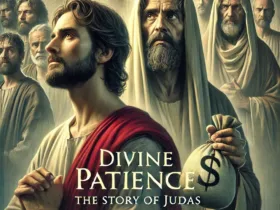The Timelessness of Temper
We live in an era where short tempers are not only commonplace but often glorified. Social media and pop culture frequently make heroes out of hot-heads. However, the question remains: does a quick temper truly serve us well? Ancient wisdom, particularly from the Bible, offers insights that are remarkably applicable today.
The Biblical Outlook on Quick Temper: A Deeper Examination
In a world that frequently equates impulsiveness with authenticity, the Bible offers a profoundly different perspective. Specifically, the book of Proverbs serves as a mirror to reflect on our characters and behaviors, acting as a guide to righteous living. Proverbs 14:17 draws a direct line between quick temper and foolish actions, warning us that the two are intrinsically linked. This ancient text forces us to confront an uncomfortable truth: our quick tempers are often the architects of our own misfortune.
The Bible’s emphasis on the virtue of patience is not limited to this one verse. Proverbs 15:18 asserts, "A hot-tempered person stirs up conflict, but the one who is patient calms a quarrel." Further, Ephesians 4:26 admonishes, "In your anger do not sin." Thus, the Bible repeatedly underscores the idea that a quick temper is not only detrimental to our spiritual lives but also invites chaos into our earthly existence.
The Bible's teachings align with modern psychological studies that indicate that impulsive anger often clouds judgment, leading to poor decision-making. From both a spiritual and a practical standpoint, the caution against quick temper is clear: it disrupts the harmony that God desires for us and creates ripples of negativity that can affect everyone in our circle of influence.
The Consequences of Quick Reactions: A Comprehensive Look
Reacting too quickly, especially in anger, frequently results in dire consequences. This is not just a spiritual principle but a practical reality that many of us have experienced. James 1:20 isn't merely a biblical verse; it's a life principle that teaches us that human anger doesn't bring about the righteous life that God desires for us. When anger takes the driver's seat, reason often takes a backseat, leading us to actions that we later regret but cannot undo.
Personal Relationships: The Fragile Fabric
In the realm of personal relationships, whether friendships, family ties, or romantic partnerships, a quick temper is often a wrecking ball. Hurtful words, once spoken, cannot be taken back. The emotional scars they leave can be long-lasting, leading to strained relationships that require immense effort to repair, if they can be repaired at all.
Professional Ramifications: The Unseen Barrier
In professional settings, a quick temper is frequently viewed as a sign of instability and a lack of leadership qualities. It can significantly hamper teamwork and collaboration, as colleagues may begin to tread carefully around you, avoiding genuine interactions that lead to innovative solutions.
Health Implications: The Silent Killer
On a personal health level, frequent outbursts of temper have been linked to an array of health problems, including stress, high blood pressure, and even heart issues. Proverbs 14:30 tells us that "A heart at peace gives life to the body, but envy rots the bones." Although this verse focuses on envy, the underlying principle can be applied to anger and quick temper as well. A peaceful heart is conducive to physical well-being, while emotional turmoil can lead to physiological problems.
The Contrast: Slow to Anger — A Model of Emotional Maturity
Being "slow to anger" isn't just a moral virtue; it's a sign of emotional intelligence and depth. The Bible sets the gold standard for this in the figure of Jesus Christ, who embodies the characteristics mentioned in Exodus 34:6: "Slow to anger and abounding in steadfast love." This isn't a call to emotional detachment, but a challenge to be more deliberate in our responses. Taking a step back allows us to examine the situation rationally, making decisions that are consistent with our deeper values and principles, and leading to better outcomes in our personal and professional lives.
The Road to Self-Control — The Linchpin of Emotional Well-being
Self-control, as pointed out in Galatians 5:22-23, is a fruit of the Spirit. It's not just about restraining our impulses but cultivating a balanced life. Developing self-control often involves embracing certain practices like mindfulness, deep-breathing exercises, and establishing a strong spiritual foundation. Introspective activities like personal Bible study and prayer are vital avenues to cultivate this trait. They serve not just as tools for spiritual growth but act as stress-relievers that can aid in impulse control.
The Power of Wise Counsel — An Underestimated Resource
Nothing happens in a vacuum. Our actions and reactions are often influenced by the company we keep. Proverbs 12:15 reinforces the importance of seeking guidance: "The way of a fool is right in his own eyes, but a wise man listens to advice." Wise counsel doesn't just keep us grounded; it provides a balanced perspective that can be the difference between an impulsive, damaging decision and a thoughtful, constructive one.
The Unseen Cost of a Quick Temper — The Domino Effect
While the immediate release of anger may offer momentary relief, the ripple effects are often catastrophic. The Bible advises against holding onto anger, as cited in Ephesians 4:26-27. Persistent anger corrodes relationships, shuts doors to future opportunities, and wreaks havoc on our physical and emotional well-being. Not to mention, it creates an environment of negativity that can impact those around us, setting off a chain of events that lead to broader discord.
The Call for Transformation — The Journey from Saul to Paul
Change is possible. If someone as fervent as the Apostle Paul, a man who was once a dedicated persecutor of Christians, can transform into one of the most influential figures in Christian history, then hope exists for everyone. This dramatic turnaround didn't happen overnight. It was a result of deep spiritual awakening and committed effort. His life serves as an inspirational testament that no one is too far gone to change, regardless of past attitudes or actions.
Conclusion: Wisdom is the Best Guide — A Lesson in Timeless Virtue
While society may often glorify the impulsive "snap" decision as an emblem of authority or authenticity, the Bible offers us a contrasting image—one rooted in wisdom, patience, and long-term vision. This isn't just archaic advice; it's a time-tested blueprint for a more balanced, harmonious life. A quick temper may appear to solve problems in the short run, but the wisdom contained in these ancient texts shows us that the real answers lie in restraint, reflection, and purposeful action.
Further Reading











Leave a Reply